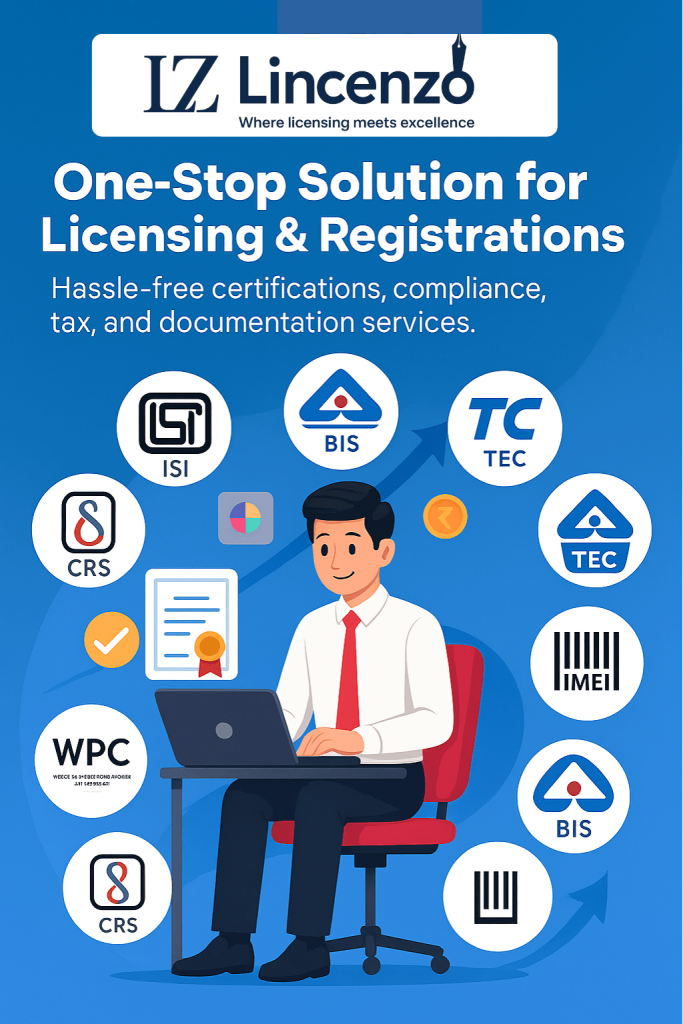

EPR Registration in India
We provide hassle-free EPR Registration services in India, ensuring smooth compliance with Extended Producer Responsibility regulations, faster approvals, and expert guidance for your business’s environmental and regulatory obligations.
What's Include

Rated at 4.9 By 43034 + Customers Globally
Certification & Licensing
Trademark
Startup
Income Tax
Compliance
Certification & Licensing
Trademark
Startup
Income Tax
Compliance
Certification & Licensing
Trademark
Startup
Income Tax
Compliance
Certification & Licensing
Trademark
Startup
Income Tax
Compliance
In India, businesses producing or selling certain products must comply with Extended Producer Responsibility (EPR) regulations under environmental laws.
Whether you are a manufacturer, importer, or brand owner, obtaining EPR Registration is essential to manage waste responsibly and meet statutory compliance requirements.
At Lincenzo, we help you obtain, renew, and manage EPR Registration — ensuring full compliance with environmental regulations so you can focus on growing your business sustainably.
EPR Registration refers to the statutory registration required under Extended Producer Responsibility regulations, mandating producers, importers, and brand owners to manage the collection, recycling, and disposal of certain types of waste.
This registration ensures that businesses comply with environmental laws and take responsibility for the end-of-life management of their products.
While not all products require EPR compliance, specific categories such as plastics, electronics, batteries, and packaging materials do — making EPR Registration essential for legal and sustainable operations.
Regulatory Compliance – Ensures businesses adhere to Extended Producer Responsibility (EPR) regulations.
Waste Management Accountability – Mandates proper collection, recycling, and disposal of specific products and packaging.
Environmental Responsibility – Promotes sustainable practices and reduces the environmental impact of products.
Reporting & Documentation – Requires submission of periodic reports on product lifecycle and waste management.
Legal Protection – Helps businesses avoid penalties, fines, and legal issues related to non-compliance.
Don’t worry — if you’re missing something, we’ll guide you on how to get it quickly.
Ensure your business meets all statutory EPR Registration requirements and avoids penalties.
Implement proper waste collection, recycling, and disposal processes for your products.
Maintain accurate records and submit compliance reports with ease.
Optimize waste management processes and reduce costs through effective EPR implementation.
Benefit from any applicable environmental schemes or credits for responsible waste management.
PAN Card (Business or Individual)
GST Registration Certificate
Bank Certificate or Cancelled Cheque
Product Details (type of product, composition, quantity, packaging)
Technical Specifications (for specific products like e-waste, plastics, batteries)
Industrial License (if applicable)
Board Resolution or authorization (for companies)
If your business deals with products that fall under Extended Producer Responsibility regulations, you likely need EPR Registration. This includes:
Businesses producing or selling regulated products must obtain EPR Registration to meet statutory requirements.
Complying with EPR allows eligibility for government incentives or support for sustainable practices.
Ensure accurate submission of product lifecycle, recycling, and waste management reports.
Non-compliance can result in fines, legal action, or business restrictions.
Implementing EPR promotes eco-friendly practices and strengthens market credibility.
Producers or brand owners of regulated products such as plastics, electronics, batteries, or packaging materials
Importers of products falling under EPR regulations
Manufacturers responsible for product end-of-life management and recycling
Distributors or sellers participating in compliance reporting and environmental schemes
Expert Help for BIS, ISI, FMCS & More — Fast, Easy & Reliable.
Validity of EPR Registration depends on the type of product and regulatory requirements:
Plastics & Packaging – Typically valid for 1 year, renewable annually.
Electronics & E-Waste – Validity as per regulatory guidelines, usually 1–2 years.
Batteries & Hazardous Waste – Validity defined under respective environmental rules, often 1 year with mandatory renewal.
If there are changes in your business name, address, GST details, or product types, you must update your EPR Registration to remain compliant and avoid penalties or legal issues.
Common mistakes to avoid during EPR Registration:
Applying under the wrong product category or compliance type
Submitting incomplete or incorrect documents
Using outdated business or GST details
Failing to meet reporting or recycling obligations on time
Difference Between Basic Business Registration & EPR Registration
| Feature | Basic Business Registration (PAN/GST) | EPR Registration |
|---|---|---|
| Purpose | Acts as a legal identity for your business | Ensures compliance with Extended Producer Responsibility regulations |
| Mandatory For | All businesses | Only for producers, importers, and brand owners of specified products (plastics, electronics, batteries, packaging) |
| Validity | Lifetime | Typically 1 year, renewable annually depending on product type |
Download your free legal guide Now
Feel free to ask any query
At Lincenzo we understand our responsibility













Rated at 4.9 By 43034 + Customers Globally